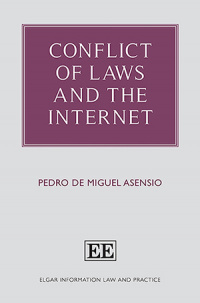In a world largely of national laws with territorial jurisdiction and enforcement, the
internet is a complicating factor. Online activities have the potential for instantaneous, global effects, implicating a variety of national legal regimes. Thus, as the internet becomes increasingly integral to much of our daily lives, conflict of law issues are certain to arise.
Chapter Five presents conflicts of law issues concerning a variety of intellectual property rights and online activity. Considering international conventions regarding trademarks, patents, and designs, treaties have accomplished "significant progress in facilitating registration of IP rights in several countries, but cross-border enforcement of IP rights has not been the focus of such conventions." By contrast, the EU has affected cross-border enforcement through harmonization and the creation of protection at the Union level, limiting the national level distinctions in IP law, thus reducing the instances of private international law issues.
 |
In Conflict of Laws and the Internet, Pedro de Miguel Asensio (Complutense University of Madrid, Spain) presents a thorough analysis of the fundamental issues of private international law regarding online activities. Presented in six chapters, the book explores a variety of legal concerns implicated by online activity, including the regulation of illegal material, the protection of personal data and personality rights, copyright law, trademarks and unfair competition, and online contracts.
Activities carried out through the Internet may have significant effects simultaneously within a great number of jurisdictions, regardless of national borders. This is of particular importance in areas such as the infringement of IP rights and the violation of personality rights
The first chapter outlines the importance of private international law as a means for facilitating the interoperability of various national legal systems, particularly as implicated by online activity. Noting a lack of uniform rules adopted by supranational organizations, the substantial differences between various national legal regimes underscore the importance of certainty regarding cross-border recognition and enforcement of judgments. The chapter presents both a global perspective as well as comparative regional perspectives, drawing contrast between the Rome I, Rome II, and Brussels I (recast) Regulations in the EU and the state-level conflicts of law rules that apply in the United States.
Chapter Two discusses torts concerning online activity, the regulation of illegal content, and intermediary liability. The chapter discusses the regulations of the E-Commerce Directive as applied to internet-based businesses, Uber and Airbnb. The safe-harbor provisions of the E-Commerce Directive are contrasted with the US DMCA, "a more detailed regime on issues such as the implementation of notice and takedown procedures."
The third chapter concerns the regulation of personal data under the GDPR; although the GDPR generally provides for full unification, there are aspects of the regulation, such as the particular age at which a child may consent to data processing, are left to the Member States. The GDPR provides for jurisdictional rules not prejudiced by the Brussels I Regulation (recast). Additionally, this chapter presents the issues of choice of law in defamation and personality rights claims, noting the resulting trend of 'libel tourism' and attempts to combat it through laws such as the US 2010 SPEECH ACT.
Chapter Four addresses conflicts of law in copyright law and the internet; the international conventions that concern copyright law provide minimum standards for protection, but offer little guidance regarding private international law issues. Similarly, while the Digital Single Market Directive seeks to promote harmonization of EU copyright law, the retention of a national approach implicates conflicts of law and the Brussels I Regulation (recast). Additionally, the chapter presents the issue of relying upon the choice of law principle, lex loci protectionis (the law of the place where protection is claimed) in cases where the infringement is ubiquitous, arising from online activity.
 |
The book concludes with a discussion of the variety of contracts arising from online transactions and activities in Chapter Six. The chapter addresses methods that contracting parties may use to preempt private international law issues, such as choice of court and choice of law agreements. The chapter also presents the legal frameworks for determining the applicable law and forum for an online contract dispute when the parties have not contracted terms for these issues.
Comment
This book is an excellent read for anyone interested in the private international law issues implicated by online activities, both those concerning intellectual property rights and other legal regulations. It provides a rigorous analysis of conflicts of law issues concerning the internet, with particular attention to EU law.
Publisher: Edward Elgar Publishing
Hardback: $275.00
Publication Date: 2020
Publication Date: 2020
ISBN: 9781788110815
Extent: 576 pages
E-book: $220.00
eISBN: 9781788110822
eISBN: 9781788110822
Book Review: Conflict of Laws on the Internet
![Book Review: Conflict of Laws on the Internet]() Reviewed by Thomas Key
on
Thursday, June 04, 2020
Rating:
Reviewed by Thomas Key
on
Thursday, June 04, 2020
Rating:



![[Guest post] Can AI be considered a PHOSITA? Policy debates in the US and the EU](https://blogger.googleusercontent.com/img/b/R29vZ2xl/AVvXsEggxDO6mW5r4n3-06Af5ckmIaMIhzgPJBoDP8AUsSYXY2zajUQt1ObGVn_GhCgidbG_YDVnybQuJ5XoAjjBG9Ws2xJWDQHNPMrLkn526SWIG371X_Kjt1E8tJmn8Ae_20Phyphenhyphen09JeuUOhhTR3aZE9lMRQlqHGQGcAWGxlo91rrKcLk0AfUjWCvw6RQ/s72-c/Two-cats-eating.jpg)







![[Guest post] Can a trademarked mascot drink, smoke, and spray graffiti under the banner of artistic expression?](https://blogger.googleusercontent.com/img/b/R29vZ2xl/AVvXsEgbyaylrzV0_WRCvj7gUUBCmaRpZYmu5l_yll7jWk32LFKedtZU9fXBnkBocu6wOPN1hNdAcmsMEbripjNMCtI5Lr3VCYfbl9_PJqCuO2Rq4biGkULEo_x_t06S-N5vBIFdAAjcR0L4Q1knvR2ZFxU_F7ZtqRmDrWbWhA7dfSvRjdYwbSx_6oSPvQ/s72-w121-c-h200/Screenshot%202024-04-17%20at%2012.32.14.png)




No comments:
All comments must be moderated by a member of the IPKat team before they appear on the blog. Comments will not be allowed if the contravene the IPKat policy that readers' comments should not be obscene or defamatory; they should not consist of ad hominem attacks on members of the blog team or other comment-posters and they should make a constructive contribution to the discussion of the post on which they purport to comment.
It is also the IPKat policy that comments should not be made completely anonymously, and users should use a consistent name or pseudonym (which should not itself be defamatory or obscene, or that of another real person), either in the "identity" field, or at the beginning of the comment. Current practice is to, however, allow a limited number of comments that contravene this policy, provided that the comment has a high degree of relevance and the comment chain does not become too difficult to follow.
Learn more here: http://ipkitten.blogspot.com/p/want-to-complain.html